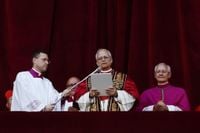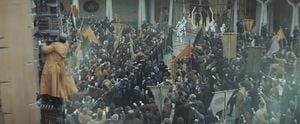In a historic moment for the Catholic Church, Robert Francis Prevost has been elected as Pope Leo XIV, marking him as the first pope from the United States. The election, which took place on May 8, 2025, in Vatican City, concluded after just four rounds of voting, demonstrating a surprising consensus among the cardinals. Prevost succeeds Pope Francis, who had been at the helm since 2013, and his election comes as the Church navigates complex cultural and theological landscapes.
Prevost, aged 69 and originally from Chicago, has spent most of his career as a missionary in Peru, where he served as a bishop in Chiclayo from 2015 until his elevation to cardinal in 2023. His deep commitment to social justice aligns closely with the legacy of his predecessor, Pope Francis, whom Prevost has been described as a firm supporter of. Rev. Mark Francis, a longtime friend, noted that Prevost is "a voice of common sense and practical concerns for the Church's outreach to the poor." This focus on the marginalized is particularly timely, as the Church faces pressing issues related to poverty and inequality.
During his first address as Pope Leo XIV, Prevost emphasized themes of peace and synodality, echoing the Franciscan continuity that has characterized Pope Francis's papacy. His choice of the name Leo XIV is significant, as it harkens back to Pope Leo XIII, a figure known for his solid orthodoxy and innovative social teachings. Prevost's selection suggests a desire to bridge divides within the Church, especially amid ongoing cultural wars that have persisted since Vatican II. The cardinals, in choosing a non-Italian pope, have adopted an approach reminiscent of Italian diplomacy—ensuring that no faction feels entirely defeated.
Prevost's relatively low profile on the global stage may come as a surprise, given the weight of his new responsibilities. He has given few media interviews and has been characterized as someone who avoids the limelight. However, his experience in both North and South America positions him uniquely to address the diverse needs of the global Catholic community. His dual citizenship, having become a Peruvian citizen in 2015, further enriches his understanding of the complexities facing the Church in different cultural contexts.
Throughout his career, Prevost has been known for his humility and ability to connect with others, regardless of their background. Jesus Leon Angeles, a coordinator of a Catholic group in Chiclayo, described him as "a very simple person who would go out of his way to help others." This characteristic is particularly important as the Church seeks to engage with various communities, including the over 1.5 million Venezuelans who have migrated to Peru in recent years. Prevost has shown special concern for these migrants, emphasizing the Church's role in providing support and outreach.
Despite his extensive experience, many of Prevost’s views on key issues remain somewhat unknown. He has expressed skepticism about the ordination of women to the clergy, reiterating concerns about "clericalizing" women, a sentiment often echoed by Pope Francis. Additionally, his record on handling sexual abuse cases has drawn mixed reviews. Bishop Accountability, a group that monitors clergy sexual abuse, commended his efforts to assist one abuse victim in Peru but raised questions about his management of other allegations against priests.
Prevost's academic background is impressive; he holds degrees from Villanova University, the Catholic Theological Union in Chicago, and a doctorate in Church law from the Pontifical College of St. Thomas Aquinas in Rome. His fluency in multiple languages, including English, Spanish, Italian, French, and Portuguese, enhances his ability to communicate effectively across cultural boundaries.
As the new pope, Prevost faces the challenge of uniting a Church that has been deeply divided over various issues. His election is seen as a potential turning point, with some observers suggesting that it signals a truce in the cultural wars that have divided Catholicism. The hope is that Prevost can navigate the complexities of modern Church life while remaining true to its core teachings. His calm demeanor and ability to listen to diverse opinions may serve him well in this regard.
In a world where international institutions often seem to be in retreat, Prevost's understanding of the Church's mission to maintain its universalism is crucial. He recognizes the need for the Church to adapt and grow while remaining rooted in its traditions. As he embarks on this new chapter as Pope Leo XIV, the global Catholic community watches closely, hopeful that his leadership will foster unity and compassion in addressing the pressing issues of our time.
As the Church moves forward under Prevost's guidance, the emphasis on outreach, dialogue, and social justice will likely remain central to its mission. The new pope's ability to engage with both conservative and progressive factions within the Church will be essential in bridging the gap that has widened in recent years. With a focus on peace and inclusivity, Prevost's papacy may indeed herald a new era for the Catholic Church, one that seeks to heal divisions while remaining steadfast in its commitment to serve the marginalized and uphold the teachings of Christ.




